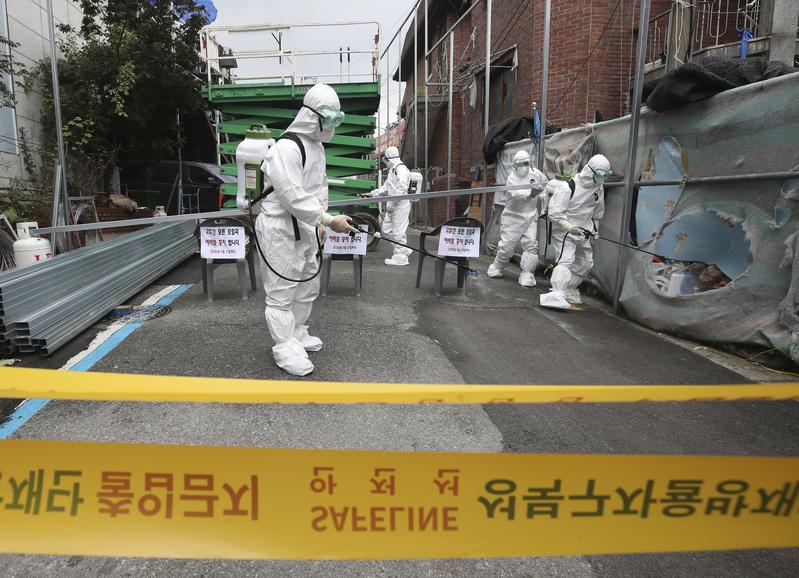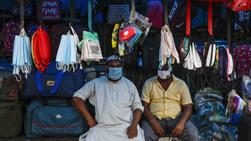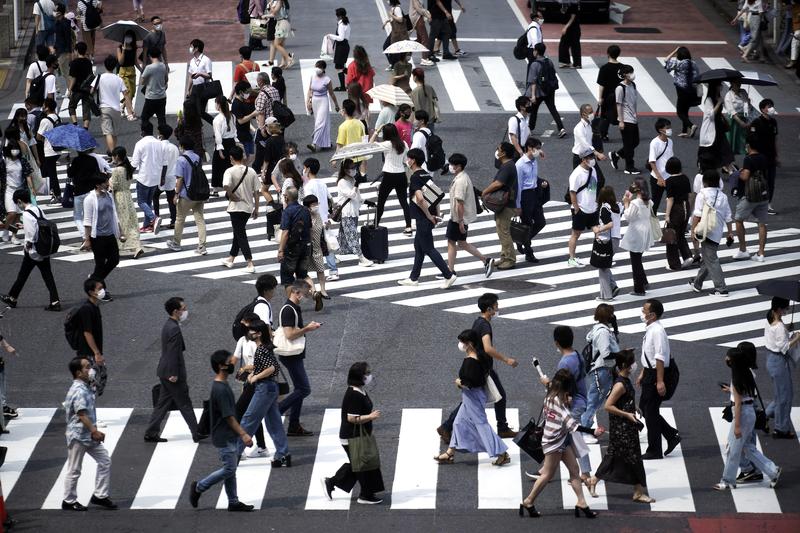 Public officials disinfect a church as a precaution against the coronavirus in Seoul, South Korea, Aug. 14, 2020. (HAN JONG-CHAN / YONHAP VIA AP)
Public officials disinfect a church as a precaution against the coronavirus in Seoul, South Korea, Aug. 14, 2020. (HAN JONG-CHAN / YONHAP VIA AP)
BEIRUT / JERUSALEM / MUSCAT / DAMASCUS / SEOUL / NEW DELHI / ADEN - A spike in new coronavirus cases in South Korea has prompted authorities to reimpose tighter social distancing curbs in Seoul, but that didn’t stop thousands of demonstrators from protesting against President Moon Jae-in’s policies.
For the second day in a row in over four months, the country has reported a sudden jump in locally transmitted cases, the Korea Centers for Disease Control and Prevention (KCDC) said.
The KCDC reported 166 new cases as of Friday, of which 155 were domestic, prompting authorities to re-introduce anti-virus measures as they worried about the spectre of a fresh wave of the disease.
South Korea used invasive tracing and widespread testing to contain its first outbreak of the novel coronavirus, but Asia’s fourth-largest economy has experienced persistent outbreaks in recent weeks, mostly in the densely populated capital area.
The new cases took South Korea’s tally to 15,039 with 305 deaths by Friday midnight. The recent spike in infections are emerging in multiple clusters, including church gatherings and restaurants.
Over 100 infections were linked to members of a Seoul church alone and those who came into contact with the churchgoers. The authorities are testing 4,000 members of the church, Health Minister Park Neung-hoo told a briefing.
Australia
Victoria state, the epicenter of Australia’s coronavirus outbreak, recorded 303 cases and four deaths in 24 hours, the health department said Saturday. The number of cases has been trending down since the state had a record 725 new infections on Aug 5. On Friday, the state saw 372 new cases and 14 deaths in 24 hours.
Nine new cases of COVID-19 were diagnosed in New South Wales, its health department said on Saturday. That brought the state’s total number of case to 3,756. One of the infected people dined at the up-market restaurant Rick Stein at Bannisters in the south coast town of Mollymook on Aug 1.
ALSO READ: Australia's state of Victoria sees 'stabilisation' in new virus cases
 Face masks hang at a roadside stall for sale in Kolkata, India, Aug 14, 2020. (BIKAS DAS / AP)
Face masks hang at a roadside stall for sale in Kolkata, India, Aug 14, 2020. (BIKAS DAS / AP)
India
India is ready to mass produce COVID-19 vaccines when scientists give the go-ahead, Prime Minister Narendra Modi said in his Independence Day speech on Saturday, also launching a national project to roll out health identities for each citizen.
At the event, soldiers who ceremonially welcomed Modi had been under quarantine days before the event. Only around 4,000 guests were allowed and made to sit six feet apart, while medical booths with ambulances were set up for any attendee showing COVID-19 symptoms during entry.
Launching a National Digital Health Mission for the country of 1.3 billion, Modi said in his seventh Independence Day speech that records of every health test, disease, medication and other details will be kept under a health ID.
Total COVID-19 cases in India crossed the 2.5 million mark in India on Saturday, reaching 2,526,192, as the total deaths reached 49,036, showed the latest data issued by the federal health ministry.
As many as 65,002 new cases were added to the tally since Friday, while 996 people died in the past 24 hours due to the virus.
Israel
The number of COVID-19 cases in Israel has reached 91,080, with 1,258 new cases, the Israeli Ministry of Health said on Friday.
The ministry said that the death toll in the country reached 665, with 14 new deaths, while the number of patients in serious condition increased from 371 to 375, out of 783 patients currently hospitalized.
The number of recoveries reached 66,965, with 2,219 new ones, while the number of active cases dropped to 23,450.
 People wearing protective masks to help curb the spread of the coronavirus walk at Shibuya pedestrian crossings, Aug 13, 2020, in Tokyo. (EUGENE HOSHIKO / AP)
People wearing protective masks to help curb the spread of the coronavirus walk at Shibuya pedestrian crossings, Aug 13, 2020, in Tokyo. (EUGENE HOSHIKO / AP)
Japan
New coronavirus cases in Tokyo topped 300 for the second straight day on Saturday, according to government data.
The city’s new infections totaled 385, down slightly from 389 on Friday. Patients in their 20s were the biggest group, accounting for 120 new cases, followed by 84 people in their 30s. Saturday’s figure brings the total number of infected people in Tokyo to 17,454, of which 23 are in critical condition.
The Tokyo Metropolitan Government will keep in place its highest alert for the spread of the coronavirus, as infections are spreading for all age groups, the city’s virus monitoring panel members said at a Thursday meeting. Governor Yuriko Koike said the current situation doesn’t call for an emergency declaration in the capital.
Lebanon
Lebanon's number of COVID-19 infections increased on Friday by 334 to 8,045 while death toll went up by two to 94, the Health Ministry said.
The Lebanese health sector has been facing tough challenges following the explosions that rocked Beirut on Aug. 4, killing at least 177 people and wounding over 6,000 others.
Hospitals could not offer services to all injured people prompting foreign countries to send field hospitals to help treating the injured and receiving COVID-19 patients.
New Zealand
New Zealand on Saturday reported seven new cases of the coronavirus as a lockdown in the country’s biggest city, Auckland, was extended on Friday in response to the country’s first coronavirus outbreak in months.
Six of the seven new cases have been linked to the cluster responsible for all the previous community cases, while one case was being investigated, Director-General of Health Ashley Bloomfield told a media briefing in Wellington.
The new cases bring New Zealand’s total infections since the start of the year to 1258, while the number of currently active cases stands at 56. Twenty two people have died so far.
The lockdown in Auckland, home to 1.7 million people, was extended for nearly two weeks, and followed the discovery on Tuesday of the country’s first COVID-19 infections in 102 days, in a family in Auckland.
New Zealand and its neighbour Australia have suffered far less death and disease from the COVID-19 pandemic than many other nations, thanks in part to swift lockdown measures. Although economically costly, the measures raised public trust in the leaders of both countries significantly.
Oman
The Omani Ministry of Health on Friday announced 212 new COVID-19 cases, taking the tally of infections in the country to 82,743.
The ministry said in a statement that the total recoveries from the virus rose by 149 to 77,427, while the death toll hit 557 after six more deaths were added.
The disease recovery rate in Oman was 93.6 percent.
Qatar
The Qatari Health Ministry on Friday announced 251 new COVID-19 infections, raising the total number of confirmed cases in the Gulf state to 114,532, the official Qatar News Agency (QNA) reported.
Meanwhile, 301 more recovered from the virus, bringing the total recoveries to 111,258, while the death toll remained 190, according to a ministry statement quoted by QNA.
The ministry attributed the increase in coronavirus infections to gatherings and visits as well as ignoring the preventive measures such as staying at home and social distancing.
Syria
The Syrian Health Ministry said 83 new COVID-19 cases were reported in government-controlled areas on Friday.
With the new cases, a total of 1,515 infections have been registered in government-controlled areas in Syria since March, according to the health ministry.
China has offered help to Syria to fight the COVID-19 pandemic.
READ MORE: Philippines sees 61 new virus deaths, biggest spike in 3 weeks
The Philippines
Many areas in the Philippines will be under looser movement restrictions from Sunday until Aug 31, while a decision on the capital region and nearby provinces will be announced by President Rodrigo Duterte on Aug 17, his spokesman Harry Roque said in a televised briefing on Saturday.
Duterte early this month placed Metro Manila and the provinces of Bulacan, Cavite, Laguna and Rizal under a stricter lockdown for 15 days until Aug 18 following a recommendation from doctors as a spike in infections overwhelmed the health care system. The Philippines has the worst coronavirus outbreak in Southeast Asia.
UAE
The United Arab Emirates (UAE) on Friday announced 330 new COVID-19 cases, bringing the total confirmed cases in the country to 63,819.
UAE's Ministry of Health and Prevention said in a statement the new cases of many nationalities are all in a stable condition and receiving medical treatment.
The ministry added that 101 more patients have recovered from the virus, taking the tally of recoveries in the UAE to 57,473.
Yemen
The total number of COVID-19 cases in Yemen's government-controlled provinces increased to 1,858 on Friday, as 11 new cases were officially confirmed.
The Yemeni Health Ministry said in a brief press statement that during the past 24 hours, the number of recoveries in the government-controlled areas increased to 1,009 since the outbreak of the novel coronavirus on April 10.
Also, the government announced that the death toll from the deadly respiratory disease climbed to 528 in different areas under its control, including the southern port city of Aden.


